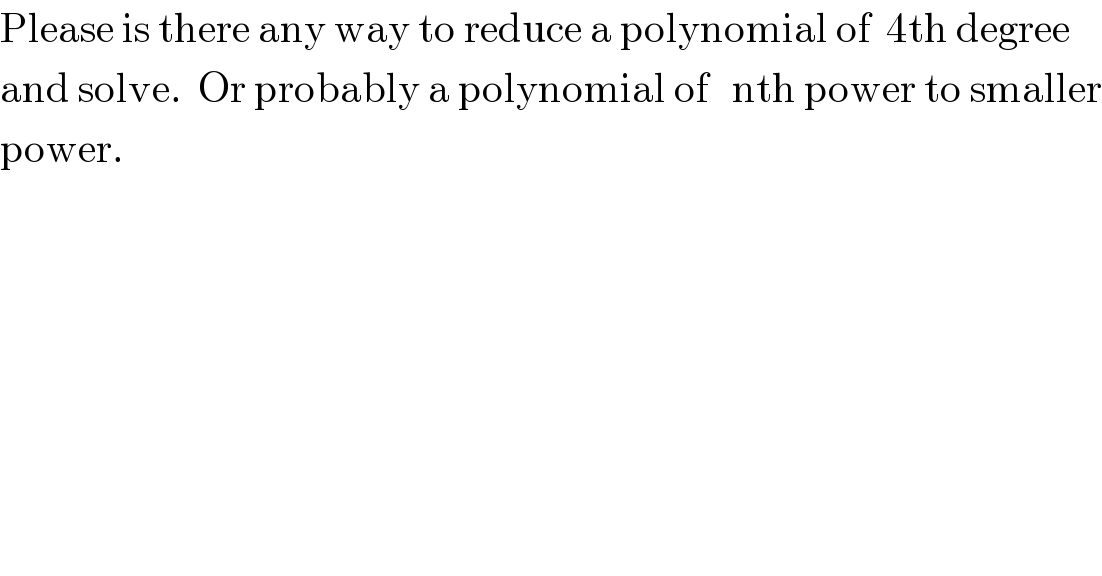
Question and Answers Forum
Question Number 56479 by Tawa1 last updated on 17/Mar/19

Answered by ajfour last updated on 17/Mar/19

Commented by Tawa1 last updated on 17/Mar/19

Commented by ajfour last updated on 17/Mar/19
![Or after t^4 +Bt^2 +Ct+D=0 we let x=((pt+q)/(t+1)) then (pt+q)^4 +B(pt+q)^2 (t+1)^2 + C(pt+q)(t+1)^3 +D(t+1)^4 =0 ⇒ p^4 t^4 +4p^3 qt^3 +6p^2 q^2 t^2 +4pq^3 t+q^4 + B(p^2 t^2 +2pqt+q^2 )(t^2 +2t+1)+ C(pt+q)(t^3 +3t^2 +3t+1)+ D(t^4 +4t^3 +6t^2 +4t+1)=0 ⇒ __________________________ (p^4 +Bp^2 +Cp+D)t^4 + (4p^3 q+2Bp^2 +2Bpq+3Cp+Cq+4D)t^3 +(6p^2 q^2 +Bp^2 +4Bpq+Bq^2 +3Cp+3Cq+6D)t^2 +(4pq^3 +2Bpq+2Bq^2 +Cp+3Cq+4D)t +(q^4 +Bq^2 +Cq+D)=0 __________________________ & if we let coefficients of t^3 & t to be zero we obtain a quadratic in t^2 . 4p^3 q+2Bp^2 +2Bpq+3Cp+Cq+4D=0 4pq^3 +2Bpq+2Bq^2 +Cp+3Cq+4D=0 subtracting we get 4pq(p+q)+2B(p+q)+2C=0 ..(I) And adding we get (4pq+2B)(p^2 +q^2 )+4Bpq+ 4C(p+q)+8D=0 ...(II) Solving this pair of eqs. (I)&(II), we′d have reduced a biquadratic to a quadratic. rewriting eq. (II) (4pq+2B)[(p+q)^2 −2pq]+4Bpq +4C(p+q)+8D=0 ⇒ 4C(p+q)+8D=−(4pq+2B)(p+q)^2 using (I) herein ⇒ 4C(p+q)+8D=2(p+q)[C+B(p+q)] ⇒ B(p+q)^2 −C(p+q)−4D=0 ⇒ p+q = (C/2)±(√((C^( 2) /4)+4D)) = k pq = −(B/2)−(C/(2(p+q))) = −(B/2)−(C/(2k)) = l p, q are roots of z^2 −kz+l=0 p, q = (k/2)±(√((k^2 /4)−l)) Now we have (p^4 +Bp^2 +Cp+D)t^4 +(6p^2 q^2 +Bp^2 +4Bpq+Bq^2 +3Cp+3Cq+6D)t^2 +(q^4 +Bq^2 +Cq+D)=0 which is a quadratic in t^2 , and can be solved. And x=((pt+q)/(t+1)). ■](Q56488.png)
Commented by Tawa1 last updated on 17/Mar/19

Commented by Tawa1 last updated on 17/Mar/19

